The Lark Read online
Page 5
‘Me, too,’ said another. ‘Give us a bit too, lady.’
‘I’m awful fond of flowers.’
And next moment there was a crowd of men and boys holding on to the green railings of Hope Cottage, and all clamouring for just one flower. The group blocked the pathway, and newcomers stopped to see what was going on, and the crowd grew and grew.
Jane came to the fence and raised her voice. She had learned to do that in the school plays.
‘Look here,’ she said, ‘I’m awfully sorry, but I can’t give flowers to all of you.’
‘Never mind, miss,’ said one, ‘we know your heart’s good.’
‘No need to give,’ said a black-bearded, serious-looking man. ‘I’ll pay for mine.’
‘So’ll I,’ said a dozen voices.
‘I was first, miss.’
‘Me next.’
‘How much?’
‘How much ought I to say?’ Jane lowered her voice to ask her first friend, who had pinned her gift to his buttonhole.
‘Twopence a bit,’ he answered.
Jane broke off her cherry-coloured blossom into sprays and handed them over the railings, receiving many pennies in return.
‘You ought to sell bokays, miss,’ said one of the men. ‘Lots of the chaps would like to take home a bunch to the missus of a Saturday. You put up a board and say, “Flowers for sale here.” Not but what it would be a pity to rob the garden.’
‘Oh, but we want to sell the flowers,’ said Jane. ‘Thank you so much. I’ll get a board ready.’
‘I’ll bring you along a bit o’ board,’ said the man with the carpenter’s bag, ‘all ready painted white – and you can do the letters on it yourself with Brunswick black. All saves expense.’
When the little crowd had dispersed, Jane was left rather breathless, with blackened hands and apron-pockets weighed down with what the police call bronze.
She heaved it all out onto the kitchen-table, where Lucilla sat busy as usual with pencil and paper. The coins rattled and rang and spun on the smooth scrubbed deal; a couple of adventurous sixpences and a rollicking halfpenny escaped to the floor, and at least three pence rolled under the dresser.
‘What on earth’s all this?’ Lucilla asked, as well she might.
‘Your destiny, my destiny,’ Jane told her. ‘It’s the finger of Fate. Drop those everlasting lists. Away with them! We’re in trade!’
‘But where did you get all this money?’ Lucilla asked, beginning to arrange the pennies in piles of twelve.
‘In the garden,’ said Jane dramatically; ‘buried treasure – first instalment, to be continued in our next. No, don’t look vacant, Luce darling. I’m not insane, and I will tell the truth as soon as I get my breath. Put away that pencil, burn that paper. No more lists! I got that money by selling flowers out of the garden. We will get our living by selling flowers out of the garden. Ourselves. To people who go by and admire. No sending our flowers to market to be sold all crushed and bruised and disheartened. “Fresh flowers sold here” – that’s what’s going on the board. No, “Fresh cut flowers sold here.” I shall paint the board tomorrow. Why, the board for the gate, of course, to show the world what we sell. Let’s count the money. I make it fifteen and eightpence.’
‘It is fifteen and ninepence halfpenny,’ said Lucilla, and added slowly, ‘it’s quite a good idea, Jane.’
‘Out with it,’ said Jane, adjusting the little silver tower of her eleven sixpences. ‘What’s the dreadful drawback?’
‘I hate to throw cold water,’ said Lucilla, ‘but how long will the flowers in our garden last if we sell them like this? You’ll be “sold out”, as the shops say, before the paint’s dry on your board.’
‘But more flowers will come out.’
‘Not fast enough.’
‘We could buy flowers at Covent Garden and sell those.’
‘Then they wouldn’t precisely be fresh-cut, would they?’
‘True. How right you always are!’
‘The fact is,’ Lucilla went on, ‘you make fun of my lists – but I’ve learned one thing by making them. I see that every plan we can make for making money here is made impossible by one thing. The house is too small.’
‘Then we must get another house.’
‘That’s so easy, isn’t it, with all the papers we bought at the station full of the housing problem? There aren’t any other houses. You know there aren’t.’
‘I don’t know anything so absurd. There must be houses with bigger gardens than ours. People might want to exchange.’
‘You think we might advertise: “People who don’t want to be bothered with large gardens can have small one in exchange”? It’s our only chance. We can never do anything with Hope Cottage except live in it – and that we can’t do on the interest of your five hundred pounds – or else let it. Now, if we let it furnished, we could partly live somewhere else on the money.’
‘I don’t want to “partly” live anywhere,’ said Jane. ‘I wish to warm both hands before the fire of life.’
‘Well, you’ll never warm them here,’ said Lucilla.
‘The worst of it is that you’re so often right,’ said Jane, tying the money up in a clean blue-checked duster and hiding it in the plate-warmer. ‘No burglar will ever think of looking for it there. Now let’s go out and look for a house.’
When they had locked the front door behind them Lucilla stood on the step surveying the front garden.
‘What’s-his-name and the ruins of Carthage,’ said Jane, flippant, but a little uneasy too.
Lucilla walked to the corner of the house and looked round it.
‘Why,’ she said, ‘there’s not a flower in sight!’
‘Fifteen and eightpence,’ said Jane – ‘I mean ninepence, and a good deal of that was ivy.’
‘I shouldn’t put up the board here,’ said Lucilla, ‘it’s hardly worth while.’
‘If we can’t get another house I shall plant flowers here.’
‘Flowers take time to grow.’
‘Annuals don’t – at least, not much. Let’s go and buy a gardening book and find a house.’
They did not find a house, but they bought a gardening book – and spent the evening over it. In the kitchen. You tend to sit in the kitchen when it is very light and clean, bright with gay-coloured crockery and sparkling with silvery tinsmith’s work; and when you have it to yourselves; and when, anyhow, you have to get your own supper, and you may as well eat it where you cook it. It saves carrying trays in and out, and you get it hotter – and afterwards, why bother to move? Especially when the kitchen window looks out on the back garden, where the fruit trees are near blossom, and the parlours both look out on the front garden, the whole of whose floral splendour has just been sold for fifteen shillings and ninepence.
A very happy evening they spent over the gardening book. Lucilla made a list of the seeds that would be wanted to carry out what was really a quite brilliant scheme for a year’s flower-growing.
‘Perhaps you’re right,’ she owned; ‘something might be done with this garden. And then there’ll be all the soft fruit coming on in the summer.’
‘Soft fruit? Yes, that’s right, it says so in the book. Currants and raspberries and gooseberries – all the squashy kinds. Hard fruit’s the sort on trees – apples and pears. We might make jam, put “Home Made Jam” on the board.’
‘And “New Laid Eggs” if we only had fowls.’
‘And “New Milk” if we had a cow.’
‘And “Home Cured Bacon” if we had a pig.’
‘And everything that people do sell if only we’d got room to grow it – if this were a decent-sized house instead of a chocolate-box.’
‘It’s the perfect house for an old maid,’ said Jane. ‘A place for everything is easy, but everything you ought to have in the place where it ought to be – that’s rare, Lucy, rare as black swans. That ought to mean money. Somewhere or other there is the real right tenant gaping open-mouthed for just this ba
it.’
‘Bed gapes for me,’ said Lucilla, ‘and it’s mutual.’
‘I suppose being in trade does make you vulgar.’ Jane seemed to ponder. ‘Even the little bit of trade we’ve had.’
CHAPTER IV
The house stood large and lonely among a wilderness of little streets, brickfields, cabbage-fields, ruined meadows where broken hedges and a few old thorn trees lingered to remind the world of the green lanes and meadows of long ago. Long red walls, buttressed in days when the eighth Henry was king, enclosed a garden that even then had been a garden for uncounted years. The orchard and paddock, too, were ringed with the same high, heavy brickwork, but in front of the house the wall gave place to a tall railing wrought in iron of a very beautiful and graceful design, and at each end of this a double carriage gate, also of wrought iron, flanked by square brick pillars with stone coping and stone balls. A much more magnificent entourage than seemed demanded by the house itself, a dwelling comparatively modern. It could not have seen two hundred summers, and had obviously been built on the site of a much older and more magnificent mansion. Its light Italian structure showed strangely among cedars that had grown up beside the solid splendours of a Tudor dwelling. The long, low, white front of it faced the road, and the queer, squat, round tower at one corner rose against a background of yew hedges that must have been already tall when the house began to rise from its foundations.
Though the house looked deserted it did not look decayed. There were no loose copings on the wall, and the iron screens and gates had not been suffered to rust. The weather had not yet destroyed the stucco complexion of the house, and though ivy rioted over half the green-grey of its roof, every slate was in its place.
The wall and iron palings were strong and practically boy-proof, but the house was near enough to the road to be assailable by the skilled catapultist or the unskilled brick-bit thrower. For this, or for some other reason, all the windows on the front of the house were shuttered fast, or, in the upper storey where shutters were not, frankly boarded up with rough deal. The untrimmed lawn before the house was sprinkled with daffodils and hyacinths, and beyond, through and over thick shrubberies, were glimpses of blossoming almond and thorn, and the brown haze of fruit trees covered with the gauzy veil of little buds that spring throws over wood and orchard.
‘The house was made for us,’ said Jane, when they had ranged up and down the iron grating and tried both the iron gates.
‘Too big,’ said Lucilla. ‘Besides, look at the board.’
‘That only shows that the owner’s weak-minded. We’ll apply to the Court of Chancery, or whatever it is. The Lord Chancellor will say, “Certainly, dears,” or whatever Lord Chancellors do say. And we shall have the house.’
The board, whatever weakness it stood for, was strong enough in its statements. It said in large white letters on its black self:
THIS HOUSE
IS NOT
TO LET.
Apply to:
Messrs. P. Tutch & Co.,
207, High Street.
But the ‘Apply to’ had been painted over by the same unskilled hand, apparently, as had painted in the wavering IS NOT.
‘I don’t care what you say.’ Jane addressed not Lucilla but the board. ‘I shall apply to Messrs. Tutch and Go – and I shall do it now. Come on.’
‘It’s much too big,’ said Lucilla, but yielding.
‘Not for P.G.’s,’ said Jane.
‘We couldn’t furnish it.’
‘Hire purchase,’ Jane reminded her. ‘I saw that in the paper too. You pay out of your income so that it doesn’t cost you anything. No, I don’t exactly see how – but there it is. We can’t expect to understand everything.’
‘We should want an army of gardeners.’
‘Men who’ve fought in the war and got pensions too small. They can come and garden and share the profits.’
‘But when the board distinctly says that the house isn’t to let …’
‘Bother the board!’ said Jane. ‘I expect we shall find it doesn’t know its own wooden mind.’
But apparently it did. Messrs. Tutch and Co., represented by a small inky boy who ate something secret out of a paper-bag throughout the interview, held out no hopes. The house was not to let. Nothing would induce the owner to let it. Yes, it had been let, but the party that had had it did something they oughtn’t – blest if he knew what – and the old gent it belonged to said no more lets for him.
‘So he went and disfigured of our board, and pays our firm so much a year to let the board stay there looking silly. No, miss, we ain’t got no other houses to let – what do you think? Could sell you one – a nice semi with bay windows, five rooms and scullery. No bath. Twelve hundred. Like to go over it?’
‘Not to-day, thank you,’ said Jane, quailing, ‘but we’d like to go over the big house. Couldn’t we do that? What is the house called?’
‘Cedar Court. No, that you couldn’t …’
‘Not even if …’ said Jane, her fingers busy with the silver meshes of her bag – one of the Guardian’s latest gifts.
‘Not if it was a hundred thousand down,’ said the boy, filling his mouth. ‘You see,’ he added with frank regret, ‘we ain’t got the keys at the office.’
‘Who has got the keys?’
‘Him. Himself. The old gent,’ said the boy. ‘He don’t let them out of his ’ands except to the charlady as cleans up a bit sometimes. He’s close, he is.’
‘And what’s his name?’ asked Jane insinuatingly.
‘Oh, go along, miss, do,’ said the boy. ‘I ain’t going to get into trouble along of gells – coming round me like spinxes. I see your game. Worm his name and address out of a chap and then go and badger him same as you’re doing me now. Lose me my job as like as not. Good morning, miss.’
‘So that’s no good,’ said Lucilla, as they walked away. ‘I don’t think he meant sphinxes. He meant sirens. It’s rather nice to be sirens, don’t you think?’
‘Not when Ulysses is eating out of paper-bags.’
‘I wish we’d asked the charlady’s name.’
‘Perhaps our charlady would know?’
Their charlady knew a little. She knew why the house was so definitely not to be let, and told them as she compounded a plum cake.
‘The gentleman as owns it,’ she told the girls, ‘he don’t live in it ’cause it’s too big, him being a single man. And he’s rolling in money; he just only let it to keep it from the damp, so to speak. The last tenant, he didn’t mean no harm. He thought the old gentleman would be only too pleased – he did it all at his own expense and looked for thanks, instead of which explosions and Catherine wheels and no renewing the lease. “Out you go, my lord,” and double quick it was. The tenant, he was here to-day and gone tomorrow as the saying is. The old gentleman must have been a holy terror – it takes something to get anybody out of a house, doesn’t it? But he went like a lamb, explaining to the last, with the very cab at the door, that he had only done it to oblige and meant it all for the best. Don’t take the stoned ones, if it’s all the same to you, miss. I shall have to weigh up again.’
‘Sorry,’ said Lucilla, and left off eating raisins. ‘But what did he do? What was it he meant all for the best?’
‘The paint, miss,’ said Mrs Doveton, beating eggs. ‘He’d painted the woodwork first rate, three coats.’
‘Three coats, and everything handsome about him,’ murmured Jane.
‘Yes, miss, two flat and one round – and the house needed it, I tell you. Never a bit of paint since it was built, and most of the rooms lined with wood right up – same as doors; black as your hat they was, and he painted them nice bright colours – pink and blue, and a good gas green and a canary yellow; and how was he to know the old gentleman liked ’em all black and crocked? He hated paint, he did – same as you and me might hate dirt. Well, it was no use talking. There it was, and there it is. And that’s why he won’t let the house no more.’
When they were
back in the little sitting-room with the lustres and the beaded fire-screen, Lucilla said:
‘I don’t want to be mingy, but do you think we ought to have cake – with all those raisins and so many eggs? I hate to say it, but oughtn’t we to economise?’
‘No,’ said Jane firmly, ‘that’s the one thing we won’t do. You can’t have a lark of any sort if you’re always counting the halfpence. We won’t spend more than we’re obliged – that’s not economy – it’s just common sense. And we’ll make as much money as we can. That’s the way to get on in life. Not by saving, but by making. Let’s get some oranges and make some marmalade, and when people come for flowers and we haven’t got any we’ll sell them marmalade instead. There are heaps of jampots on the top shelf in the china cupboard.’
They made fifty-six pounds. It was hot work, but printing the labels with pretty letters was fun. And, sure enough, they sold every pot. And could have sold them twice over.
‘Do you think we sold it too cheap?’ they asked Mrs Doveton.
‘Lord love you, no!’ she said. ‘It’s good marmalade, and besides, there’s the novelty; the boys enjoy buying it off you two sweet young ladies with no hats and their hair blowing in their eyes. Why wouldn’t they buy it? Lucky to get it, I say.’
‘But we can’t live on what we make out of the marmalade, and there aren’t half enough flowers,’ Lucilla would say. And Jane would say:
‘Oh, if we only could have the House! I say – let’s go and look at it.’
And then they would go and look and look and long and love it through its iron railings, and desire passionately the right to gather and sell the flowers that budded and bloomed and withered before their eyes out of reach – out of reach.
‘If we were born fortunate,’ said Lucilla, ‘we should catch the charlady here on one of her cleaning days, and bribe her, and then …’
‘We are born fortunate,’ Jane insisted. ‘That’s what you don’t seem to see. We are. Our star would make Napoleon’s look small. When did two girls of our age have such a chance as we’ve got – to have a lark entirely on our own? No chaperone, no rules, no …’

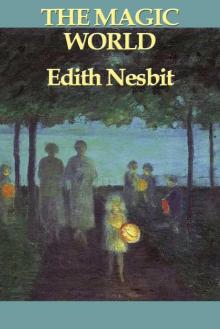 The Magic World
The Magic World In the Dark
In the Dark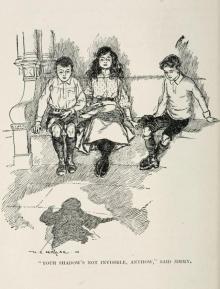 The Enchanted Castle
The Enchanted Castle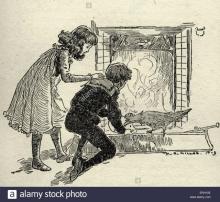 The Phoenix and the Carpet
The Phoenix and the Carpet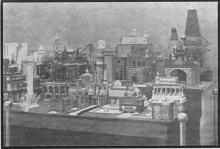 The Magic City
The Magic City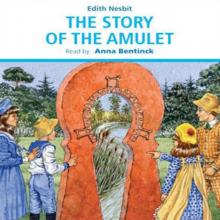 The Story of the Amulet
The Story of the Amulet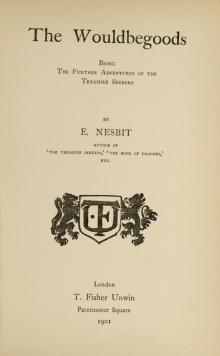 The Wouldbegoods: Being the Further Adventures of the Treasure Seekers
The Wouldbegoods: Being the Further Adventures of the Treasure Seekers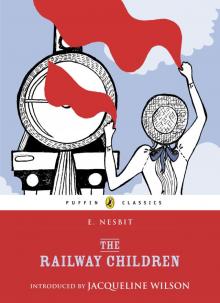 The Railway Children
The Railway Children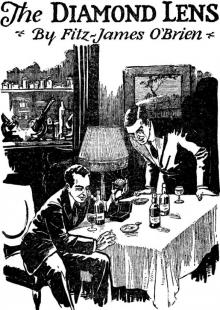 The Diamond Lens
The Diamond Lens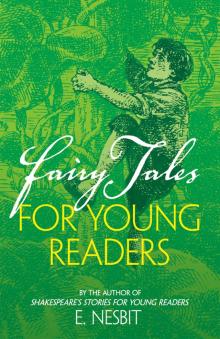 Fairy Tales for Young Readers
Fairy Tales for Young Readers Shakespeare's Stories for Young Readers (Dover Children's Classics)
Shakespeare's Stories for Young Readers (Dover Children's Classics)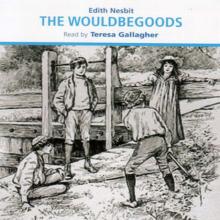 The Wouldbegoods
The Wouldbegoods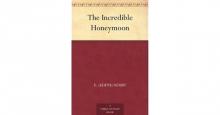 The Incredible Honeymoon
The Incredible Honeymoon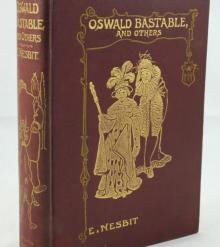 Oswald Bastable and Others
Oswald Bastable and Others Pussy and Doggy Tales
Pussy and Doggy Tales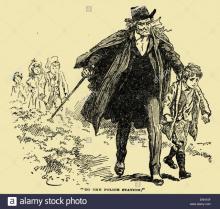 New Treasure Seekers; Or, The Bastable Children in Search of a Fortune
New Treasure Seekers; Or, The Bastable Children in Search of a Fortune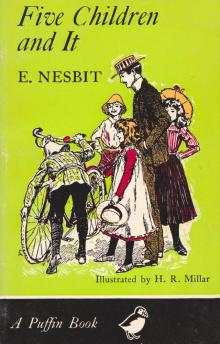 Five Children and It
Five Children and It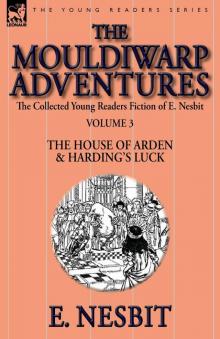 Harding's luck
Harding's luck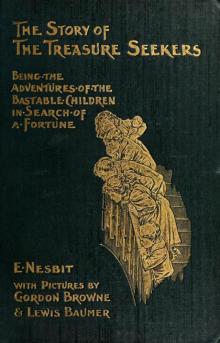 The Story of the Treasure Seekers
The Story of the Treasure Seekers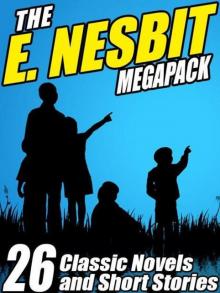 The E. Nesbit Megapack: 26 Classic Novels and Stories
The E. Nesbit Megapack: 26 Classic Novels and Stories Shakespeare's Stories for Young Readers
Shakespeare's Stories for Young Readers